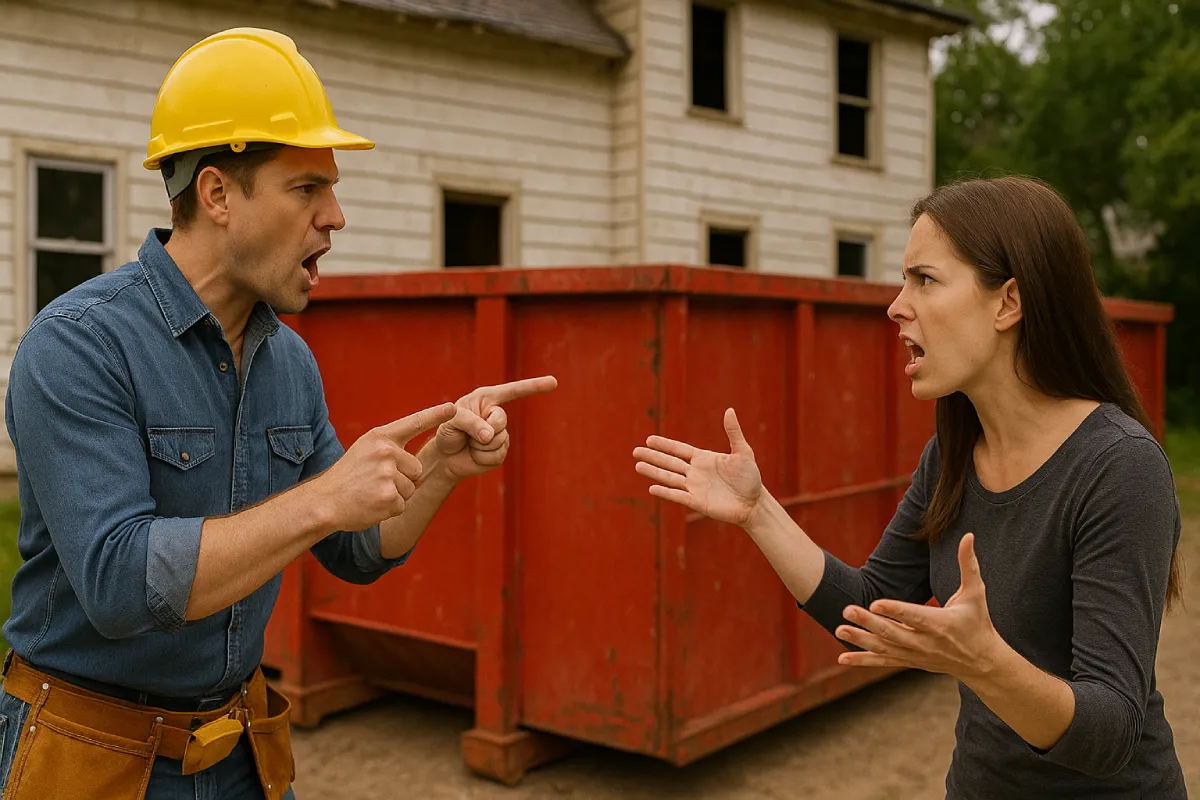Introduction: The Unexpected Renovation Hurdle
Dumpster rental disputes typically cost $200-$800 in unexpected fees due to weight limits, prohibited materials, or property damage.
Use our live calculator below to get your exact renovation cost in seconds.
Understanding the Bin Rental Agreement

The first step in any dispute is understanding the rules of the game. In this case, that means diving headfirst into your bin rental agreement. This document is your primary defense and your guide. Don't just skim it; analyze it. Check the fine print for details about rental duration, weight limits, and prohibited items. If the lingo is as confusing as your first attempt at laying laminate flooring, don't hesitate to ask the rental company for a plain-English explanation. It's their job to help you understand, not to confuse you further.
Key Clauses to Scrutinize:
- Rental Period: How long do you have the bin? What are the charges for extending the rental? Is there a grace period for pickup?
- Weight Limits: This is a major source of disputes. Your agreement should specify the maximum weight included in the base price. Exceeding it can lead to hefty overage fees, often charged per ton. Be aware that rain or snow can add significant weight to the contents.
- Prohibited Materials: Most companies have a strict list of what you cannot throw away. This often includes hazardous materials (paint, chemicals, asbestos), electronics, tires, and appliances. Disposing of these items in the bin can result in fines.
- Overage and Additional Fees: Look for a detailed fee schedule. This can include charges for overweight loads, blocked access for pickup/delivery, trip fees if the driver has to return, and penalties for prohibited items.
- Property Damage Waiver: Does the contract absolve the company of any damage to your driveway, lawn, or property? While common, these clauses can sometimes be negotiated or at least warrant a thorough documentation of your property's condition before the bin arrives.
If you don't have a written contract, you're in a tougher spot, but not without recourse. Your verbal agreement, any emails, or text messages can still serve as evidence of the terms you agreed upon. However, this is a lesson for the future: always get it in writing.
Is Your Renovation on Budget?
Unexpected costs like dumpster fees can throw your budget off track. Use our calculators to plan your project expenses accurately and stay in control.
Plan Your ProjectCommon Causes of Dumpster Disputes
Understanding common pitfalls can help you anticipate problems. Most disputes arise from a few key areas:
- Surprise Charges: The most frequent issue is a bill that's much higher than expected. This is usually due to overweight fees, which can be a shock if you've never dealt with tonnage pricing.
- Property Damage: A heavy bin, especially when dropped or dragged, can crack driveways, tear up lawns, or scrape siding.
- Pickup and Delivery Issues: The company may fail to deliver or pick up the bin on the agreed-upon date, disrupting your renovation schedule. Conversely, they might claim you blocked access, leading to extra trip fees.
- Disagreements Over Contents: A dispute can arise over whether you disposed of prohibited materials. The company might charge a "sorting fee" or a penalty based on their assessment.
The Power of Documentation: Your Best Defense
In any dispute, evidence is your best friend. Before the bin is even delivered, you should be in documentation mode. This proactive approach can shut down a potential dispute before it even begins.
Your Documentation Checklist:
- Before Photos: Take clear, date-stamped photos or a video of your driveway, lawn, and any surrounding areas where the bin will be placed. Document any pre-existing cracks or damage.
- During Photos: Take pictures of the bin's contents as you fill it, especially near the top, to show you haven't overfilled it and aren't disposing of prohibited items.
- After Photos: Once the bin is picked up, immediately take photos of the area to document any new damage.
- Written Communication: Keep a record of all emails and text messages. After any phone call, send a follow-up email summarizing the conversation: "Hi [Name], just to confirm our call today, you agreed to pick up the bin on Friday before noon. Please let me know if this is incorrect." This creates a paper trail.
- Keep Notes: For every phone call, jot down the date, time, the name of the person you spoke with, and what was discussed.
This may seem like overkill, but when you're facing an unexpected charge of several hundred dollars, you'll be glad you have a folder full of evidence to back up your claim.
Negotiating Your Way Out of the Dumpster
Once you understand the agreement and have your documentation, it's time to sharpen your negotiation skills. Approach the situation calmly and professionally, just as you would if you were choosing the right tile flooring for your home. Explain your side, listen to theirs, and work towards a resolution. Remember, the goal here is to resolve the dispute, not to win a shouting match.
A Step-by-Step Guide to Effective Negotiation:
- Stay Calm and Professional: Begin the conversation with a polite and calm tone. Yelling or making accusations will only make the other party defensive.
- State the Facts: Clearly and concisely explain the issue and why you believe there's an error. Refer to your contract and documentation. For example: "I'm calling about invoice #123. It includes a $150 overweight fee, but my contract covers up to 4 tons, and my debris was well within that limit."
- Present Your Evidence: If you're discussing property damage, offer to email your before-and-after photos. If it's about the contents, mention you have photos of what was inside.
- Listen Actively: Hear their side of the story. There might be a misunderstanding you can clear up. Perhaps their driver noted something you weren't aware of.
- Propose a Specific Solution: Don't just complain; offer a resolution. "Given the pre-existing cracks shown in my photos, I don't believe the new damage was caused by your bin, so I'm requesting the removal of the $200 damage charge." Or, "Since the pickup was two days late, I'd like to request a waiver of the overage fee as a gesture of goodwill."
- Be Willing to Compromise: Sometimes, meeting in the middle is the fastest way to a resolution. If there's a gray area, a partial credit might be a reasonable outcome.
- Get it in Writing: Once you reach an agreement, ask for it to be confirmed via email. A verbal promise is good, but a written one is a safeguard.
Keeping the Renovation Rolling
While you're handling the dispute, don't let your renovation grind to a halt. A bin dispute can take days or even weeks to resolve. Stagnation is the enemy of any project. Continue working on other areas of your project that don't depend on the bin. This can be a great time to focus on tasks like improving your room lighting or researching the latest trends in carpet flooring. Keep the momentum going, and you'll be back on track in no time.
If waste removal is the bottleneck, consider short-term alternatives. You might be able to take smaller loads to your local municipal dump yourself, or purchase heavy-duty disposal bags for smaller amounts of debris. The key is to adapt and overcome, ensuring one issue doesn't halt all progress.
Preventing Future Bin Rental Disputes
After resolving your dispute, take steps to avoid future dumpster dramas. The best way to win a dispute is to never have one in the first place. That might mean choosing a different bin rental company, clearly communicating your needs upfront, or even thinking about how to reduce waste overall, perhaps by investing in a solar panel system to reduce your long-term environmental footprint. And remember, a little preparation goes a long way in preventing future disputes.
Your Pre-Rental Checklist:
- Research and Reviews: Before hiring, read online reviews on multiple platforms. Look for patterns in complaints, especially regarding billing and property damage.
- Get Multiple Quotes: Contact at least three different companies. Compare not just the base price, but the weight limits, rental period, and all potential fees.
- Ask Questions: Ask them about their dispute resolution process. A reputable company will have a clear, customer-focused approach.
- Confirm in Writing: Before they deliver the bin, get a final quote and terms of service in writing. Confirm the placement location and any special instructions.
When to Escalate: Beyond Negotiation
What happens when you've done everything right, but the company won't budge on an unfair charge? If direct negotiation fails, you have several options for escalation.
- Formal Written Complaint: Send a formal letter or email to the company's management. Lay out your case clearly, include all your documentation, and state your desired resolution. This shows you are serious and creates an official record.
- Consumer Protection Agencies: File a complaint with your state or local consumer protection agency. These government bodies can mediate disputes and take action against companies with a pattern of deceptive practices.
- Better Business Bureau (BBB): The BBB is a non-profit organization that helps resolve disputes between businesses and consumers. While they don't have enforcement power, many companies work to resolve BBB complaints to maintain a good rating.
- Online Reviews: A factual, unemotional review detailing your experience on platforms like Google, Yelp, or HomeStars can sometimes prompt a response from the company. Stick to the facts to avoid any claims of libel.
- Small Claims Court: For significant amounts of money, small claims court is a viable option. It's designed to be accessible without a lawyer. Your meticulous documentation will be crucial here. The mere act of filing a claim is often enough to get the company to settle.
- Legal Advice: As mentioned in the FAQ, if the dispute involves a large sum or complex legal issues, consulting with a lawyer who specializes in consumer or contract law can provide clarity on your rights and options.
Final Thoughts: Turning Drama into Dust
A bin rental dispute can feel like a major roadblock, but it doesn't have to be. By understanding your agreement, documenting everything, and approaching the situation with a calm, professional attitude, you can navigate these challenges effectively. And by learning from the experience, you can ensure your future renovation projects are smoother, leaving you more time to focus on the fun parts of transforming your home. So take a deep breath, grab your evidence, and get ready to turn that dumpster drama into nothing more than dust in the rearview mirror.


Comments
Loading comments...
Leave a Comment